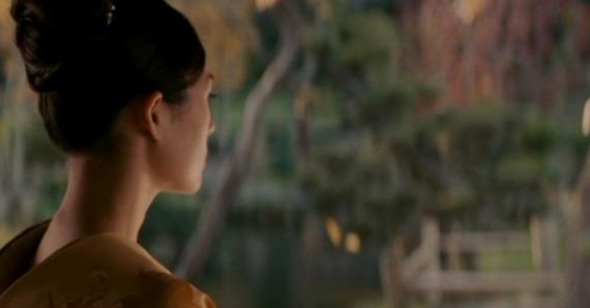Exotica
by Kristi Mitsuda
Memoirs of a Geisha
Dir. Rob Marshall, U.S., Sony Pictures
I never read the best-seller by Arthur Golden, although the paperback release of Memoirs of a Geisha neatly coincided with my post-college move from Los Angeles to the Japanese countryside to teach English. While it came highly recommended by many expatriates in my community, I didn’t want to be that foreigner (taking notes from a white man rather than through available means of direct observation), so I steadfastly resisted. Recently I read the first chapter (thanks, Amazon), and I can’t say I understand the appeal. But the literary merits (or lack thereof) of Golden’s writing aside, at least his long years of research evince an interest in a culture not his own, the same of which cannot be said for filmmaker Rob Marshall. Like a lady-who-lunches toting her Takashi Murakami-designed Louis Vuitton bag, Marshall clearly believes that his appropriation of Japanese culture lends Memoirs of a Geisha a veneer of edgy authenticity where clearly none exists.
Preparing to entertain overseas clients, Mameha (Michelle Yeoh) says to protégée Sayuri (Zhang Ziyi), “So tell me, what do we know about entertaining Americans?” As if in direct response, the director spends two hours-plus subjecting us to an exhaustively aestheticized vision of Japan which makes visually manifest ugly American tourism at its worst. A whistle-stop ride through Oriental exotica, with pauses along the way at a hanami (cherry-blossom viewing) party, sumo match, and numerous teahouses, this flashy flouting of the simplicity prized by Japanese culture sheds nary a trace of illumination, but it does demonstrate one item of note: Marshall’s belief that the way to entertain Americans is to blindside them with pizzazz and hope they won’t notice the appalling lack of substance. (“Give ‘em the old razzle dazzle, and they’ll never catch wise.”) This served him well in the frothy Chicago, but in Memoirs—which, with its overlong running time, lavish sets, historical pedigree, and John Williams score, willfully hurls itself into the “epic” category—the tactic proves a huge liability. For all the fuss over the fact that it is the first big-budget American movie comprised entirely of Asian principals, this adaptation is as far from worldly as you can get.
Oddly, Memoirs of a Geisha doesn’t do much to dispel the myth of the geisha as prostitute despite Mameha proclaiming somewhat haughtily early on: “To be a geisha is to be judged as a moving work of art.” Pruriently preoccupied with the auctioning off of Sayuri’s virginity and her rivalry with Hatsumomo (Gong Li, amazingly escaping the film’s clutches nearly unscathed), Marshall never explores the reasons the word itself means “artist.” Conceived of only as a gorgeously inert object rather than an embodiment of the artistry attained through years of training in traditional Japanese arts as varied as tea ceremony and the shamisen (reduced mostly to montage), aside from Sayuri’s strangely compelling avant-garde dance on mile-high getas, the geisha—limited strictly to her beauty and ability to flirt—is rendered baffling and, worse than that, boring.
But with an insider tell-all title like Memoirs of a Geisha pitching an idea for the adaptation based on subtleties of an already subtle subculture wouldn’t, I suppose, hold a candle to that of a Hollywood-style love story played out in a mysterious—even to the Japanese—Oriental setting. So Memoirs may set itself in Thirties Japan right on up through World War II, and it may purport to allow us private access to a secret world, but these details are incidental. Mere props upon which to set up a scenario of long-held love (and a pedophilically tinged one at that) between Sayuri and the Chairman (Ken Watanabe)—who consoled her with sweets when she was a child named Chiyo and newly sold into an okiya—an entire culture is reduced to exotic wallpaper, a colorful background against which to better hide the clichés. The film actively seeks to be described with words like “sweeping” and “sumptuous,” and this only adds further insult to injury: the melodramatic model Marshall so heartily utilizes runs counter to a culture wherein the central organizing principle of wa—harmony, balance, nonconfrontational negotiation—is defied on every level through the histrionics on display.
But what should I have expected from the man who made abundantly clear from the start his lack of regard for cultural specificity by casting ethnic-Chinese actresses (it’s particularly sad to see Zhang’s shrill performance on the heels of her 2046 career-best) to play the major parts? Half-assed pretensions to authenticity apparent in the opening scene—which takes place entirely in the native language—and a liberal scattering of Japanese phrases throughout come off as embarrassingly disingenuous, serving only to attenuate the tension between serious representation and commercialization. Marshall might not care about the former so much as the latter, but he should because the disorientations produced by his decision (Chinese women in Japan speaking often badly-mangled English?) create a gap that needs bridging in order for anyone to enjoy such spectacular schlock: suspension of disbelief. Failing at even this facile level, and too inflated with a sense of its own worth to make the so-bad-it’s-good cut, Memoirs of a Geisha dissolves into a mess so total it barely seems worth the waste of words.
